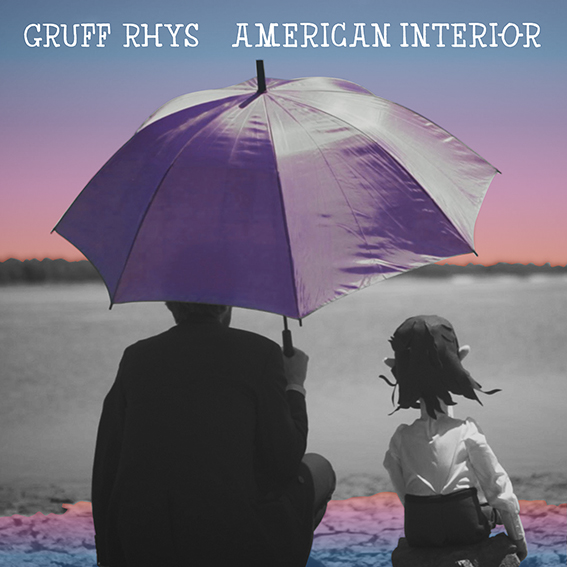A mind that needs absolutely constant nourishment in the form of continent-hopping identity crises and long-term philosophical examinations of what it means to be Welsh doesn’t immediately seem like one ready to write a pop record. Such lofty, almost insolently silly projects have been a major focus for each of Gruff Rhys’ albums. Whether he’s building a hotel out of complimentary hotel toiletry bottles or driving across Patagonia to discover a long-lost songwriting relative, Rhys has always championed the overriding insanity of his various quests and ideas over the music itself.
That’s not to say the music hasn’t been stellar along the way. Reassuringly large proportions of it have been at best sensational and at worst passably idiosyncratic, with a constant centrepiece of Rhys’ valley-rainwashed, effervescent, celestially melodious voice – by no means a shabby track record at all, especially when compared to his still-defining work with the Super Furry Animals. For American Interior, a typically multimedia and multinational endeavour, his gold-rush enthusiasm is mercifully intact and, though the musical results aren’t always as complete as they could be, they’re delightful in their modest, homespun ambition.
Eschewing the fact that, besides being an album, American Interior is also a documentary feature, an app and a book (some of which star Rhys and a felt avatar of one of his long-lost ancestors, John Evans, an 18th century Snowdonian farmhand who travelled the Great Plains of America looking for a Welsh-speaking Native American tribe), it’s an affair best enjoyed in dazzling, direct sunlight and with a hint of trucker’s arm. Though the songs are inspired by the journeys of the real John Evans, it’s easy to imagine they’re as much about Rhys himself. Their births are separated by 200 years, their nomadic and ill-defined roles in society are ideally comparable and, crucially, they both had/have that pioneering instinct that draws out the most interesting (if not always the best) in their work. For Rhys’ part at least (who knows if Evans ever threw down an LP) the pioneering has led to one of his finer albums, but not his best.
Constant references to arriving, departing and searching litter the album. Between the jangles of piano and thuds of what sounds like a very Dave Fridmann-esque rhythm section, there’s barely reference to anything else: "Sailing into Baltimore, everything’s OK", "pack your case of piety and we vacate for Liberty"). The prevailing feeling all this travelling miscellany brings to the record itself is a curious, virtuous disconnect – the impression that we’re travelling with Rhys and with Evans themselves (felt or otherwise), and that by going with them we’re discovering something hitherto unseen by Western eyes.
Musically, Rhys is and always has been most successful when dressing up his silliness in outright deadpannery (his finest moment, ‘Run! Christian, Run!’ from SFA’s Rings Around The World is the ultimate distillation of this), and so it follows with American Interior. The breezy ‘100 Unread Messages’ is a lyrically episodic but musically daft Travelling Wilburys outtake, while the incessant ‘Iolo’ attempts hypnosis with Rhys rapid-fire vocal repetition over an underdeveloped theme; both examples of his scattergun approach lacking completion. But when he does moor himself between the poles of whimsy and portent, he is in his own class. ‘Lost Tribes’, probably the strongest song here, has Fleetwood Mac levels of contemplative melancholia, with Rhys’ groaning, octave-spaced vocals lending the coda a quite transporting element. ‘Allweddellau Allweddol’ is like a Go! Team outtake, all schoolgirl chants and boingy noises, reminding us that he can be musically waggish without over-egging it.
If we’re to judge American Interior as a record alone rather than a composite part in a larger project, then the conclusion has to be that Rhys is about as successful as he ever has been. It isn’t quite as lovely as 2012’s Hotel Shampoo and it isn’t as otherworldly as his 2005 solo debut, Yr Atal Genhedlaeth, but it does manage to push his freewheeling spirit to the fore throughout and there truly is a sense that journeys long and important are being taken within and alongside the music. The only concern is for the future – what possible next project will be far-reaching enough to sate Rhys’ appetite for the ridiculous and the profound?


